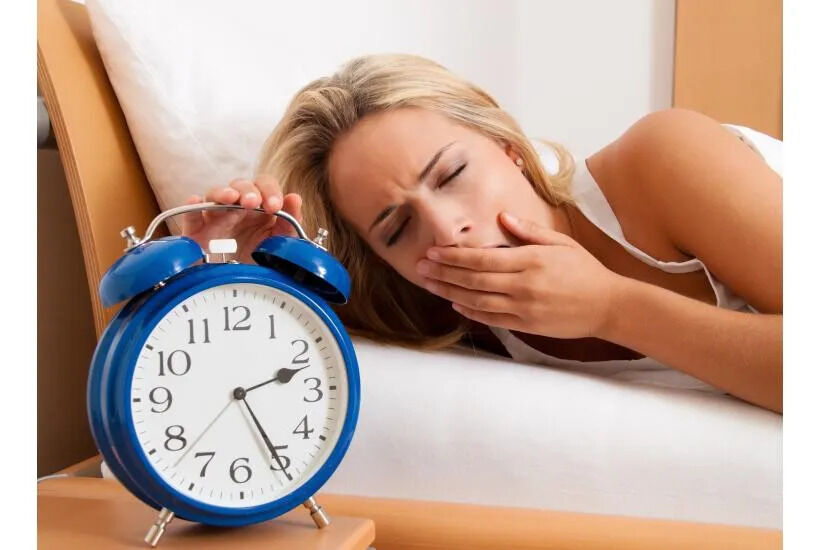Snooze and Lose: How Too Little Sleep Can Lead To Too Many Pounds

As your alarm clock welcomes you to a new day, you struggle to open at least one reluctant eye. It feels like you went to bed minutes ago. This is not true. It was hours ago. Probably four hours ago, possibly five.
Whatever the actual number, you went to bed a bit late last night.
Again.
You stagger towards the bathroom and decide to step on the scale before breakfast. The number you see is disappointing. You could blame it on your diet plan. This morning, though, you decide to blame it on your heavy eyelids. This silly thought provokes your first smile of the day.
Actually, that silly thought might contain a grain of truth.
Your heavy eyelids could be inhibiting your weight loss
The folks who crunch numbers at the Centers for Disease Control and Prevention tell us about 35 percent of Americans are sleep deprived. These same number crunchers have recently reported that about 38 percent of Americans over the age of 20 are obese.
Coincidence? Possibly not.
Most people need between 7 and 9 hours sleep on a daily basis. If you fail to give your body the sleep it requires, your body will respond in ways that make shedding unwanted pounds a major challenge. One of its favorite tactics is downright sneaky.
Insufficient sleep causes your body to play around with the production of your hunger and fullness hormones. One of these hormones, ghrelin, is the messenger that tells your brain it is time to eat. Another one of these hormones, leptin, tells the brain you've eaten enough. When you're trying to lose weight, you need a good balance of these hormones.
When you're running on short sleep your body makes more ghrelin. This means you feel hungry more often and more intensely. To make matters just a little bit worse, your sleep deprived body produces less leptin. So, your brain receives fewer and weaker signals indicating you are no longer hungry. This unbalanced situation can ruin your best intentions and destroy your willpower.
As if the ghrelin-leptin one-two punch wasn't enough of a challenge, your body throws another weight loss obstacle in your way when you fail to get enough sleep on a regular basis.
Lack of Sleep Affects Cortisol Levels

Under normal conditions, cortisol is a very useful steroid hormone. It is so useful that most of the cells in our bodies have receptors for cortisol. This hormone helps control blood sugar levels, acts as an anti-inflammatory, influences blood pressure, regulates metabolism, plays a role in memory formation and plays an important function in controlling salt and water balance. Talk about multi-tasking!
Cortisol levels are usually high when we wake up and slowly fall during the day.
When you fail to get enough sleep, your cortisol levels remain high for much longer. These higher levels of cortisol tell your brain to conserve energy. This not only leads to you getting less exercise, it also is a signal to store more fat.
Just what you needed, right? Another one-two punch!
Well, get ready for another nasty combination from your weary body and brain. Lack of sleep also impacts the frontal lobe of your brain. That's the area of your gray matter which controls complex decision-making. As a result, you are less likely to make good food decisions when you have not had enough sleep.
To aggravate this situation, the reward region of your brain, known as the amygdala, goes into overdrive when you are overtired. The amygdala causes you to crave high-calorie foods and sweet treats. When you've had an adequate amount of sleep, our dear Amy G Dala is nicely controlled by another section of your brain called the insular cortex. Unfortunately, sleep deprivation weakens your insular cortex which lets Amy run wild. She wants rewards and she wants them now. So, you find yourself snacking on all the wrong foods way too often. Thanks a lot, Amy G!
So, how do all these negative impacts translate in the real world?

According to a University of Chicago study, dieters who ran on short sleep for a 14-day period experienced reduced fat loss. With all we’ve mentioned before, that should come as no surprise. What is surprising is the fact that it was a 55 percent reduction!
In the words of the study director, Plamen Penev, assistant director of medicine at the University of Chicago, "For the first time, we have evidence that the amount of sleep makes a big difference on the results of dietary interventions. One should not ignore the way they sleep when going on a diet. Obtaining adequate sleep may enhance the beneficial effects of a diet. Not getting enough sleep could defeat the desired effects."
In other words, even if you do everything else right, failure to get adequate sleep can make it a whole lot harder to lose weight. Why make a challenging task even more difficult? Adding a bit more sleep to your daily routine just might be the boost you need to kick your diet plan into high gear.
Reaching your dream weight could be just a few extra dreams away.